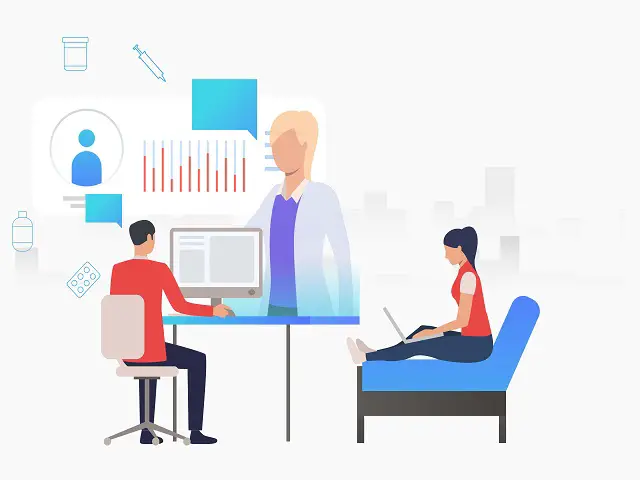Technological advancement & a growing need for evidence-based medicine are increasingly creating a need for advanced patient registry software in US.
From harnessing the potential of electronic health records (EHRs) & wearable devices for real-time patient monitoring to delving into the depths of patient registries to unravel the mystery of rare diseases, the following exploration navigates the intricate tapestry of healthcare innovation & its profound impact on individual wellbeing & medical progress
Story Outline
- Leveraging electronic health records (EHRs) and wearable devices, real-time integration with patient data enhances remote monitoring & well-being with around 33 per cent of US adults utilizing wearables for health tracking.
- Patient registries play a pivotal role in medical research, as platforms like Clinical PURSUIT expedite data collection, IQVIA offers varied registry approaches. As evidence based & personalized medicines gain prominence, the demand for comprehensive data increases
- Government initiatives & platforms like the Registry of Patient Registries (ROPR) propel healthcare quality improvement, monitoring & intervention effectiveness.
- According to Ken Research, the USA Patient Registry Software market is expected to reach $3 billion till 2028 owing to technological advancements & government initiatives which are expected to propel the market forward
1. Unleashing the Potential of EHRs, Wearable, Remote Monitoring for Better Wellness

Click to learn about EHR records in patient registry
Technological advancements such as electronic health records (EHRs) & wearable devices which help in collection, integration & analysis of patient data. Real-time integration between Electronic Health Records (EHR) /Electronic Medical Records (EMR) & wearable devices can help monitor patients remotely & improve wellbeing.
Around 33% of adults in the United States use wearable devices to track health indicators like Blood Pressure, Sugar and sleep patterns. If this data is available to medical practitioners, experts & therapists, real-time healthcare assistance can be provided to support treatment.
2. Unveiling Insights: Patient Registries as Catalysts for Medical Research

Click to read about personalized medicine
Patient registries play a crucial role in medical research & clinical studies. There are different platforms which offers patient registry services. Clinical PURSUIT is one such web based & customized platform which helps in monitoring the workflow, it helps in expertly collecting information about patients faster. IQVIA is another which provides an option amongst different patient registry approaches & data research methodologies to address the research questions.
As the efficacy of evidence based & personalized medicine grows, the demand for comprehensive based data could increase.
According to Ken Research, the USA Patient Registry Software market is expected to reach $3 billion till 2028 owing to technological advancements & government initiatives which are expected to propel the market forward.
3. Navigating the Uncharted: Patient Registries Pioneering Rare Disease Insights

Click to read about rare disease management
For rare diseases & conditions, patient registries are important for gathering data to understand the disease, track its progression & evaluate treatment outcomes. Orphanet provides systematic collection of clinical data specifically focused on a rare disease or a particular group of diseases. As more focus is put on orphan drug development, the need for specialized patient registries could rise.
4. Driving Healthcare Quality: The Power of Patient Registries & Government Support

Click to read about government initiatives in patient registry
Government initiatives might continue to promote the establishment of patient registries as part of efforts to improve healthcare quality, monitor disease trends & track the effectiveness of interventions.
US Department of Health & Home Services maintains a Registry of Patient Registries (ROPR), which is a database system designed to provide a searchable database of existing patient registries in the United States & facilitating the use of common data fields to improve opportunities for sharing, comparing & linkage.
Regulatory requirements could drive healthcare providers & organizations to implement & maintain patient registries.
5. Unlocking Insights: Patient Registries Fueling Healthcare & Innovation

Click to learn about innovation in patient registry
Patient registries can provide valuable data for healthcare analytics & population health management. The ASH Research Collaborative Data Oversight Group created a Coordinated Research Networks, which they termed a Data Hub which can ingest all forms of information including electronic medical record data, patient-reported outcomes, genomic or molecular correlates & aggregated population data. It utilizes the state-of-the-art technology so that data collection is automated wherever possible.
Patient registries can contribute to the collection of real-world evidence, aiding in treatment decision making & drug development.
Conclusion
In an era where technology & data converge to provide better healthcare, these advancements are shaping the current medical landscape. From harnessing the potential of EHRs and wearables for enhanced wellness to illuminating rare diseases through specialized patient registries & from government supported quality enhancements to the innovative role of patient data in shaping healthcare & innovation, these facts collectively pave the way for evidence-based treatments & healthier future.





